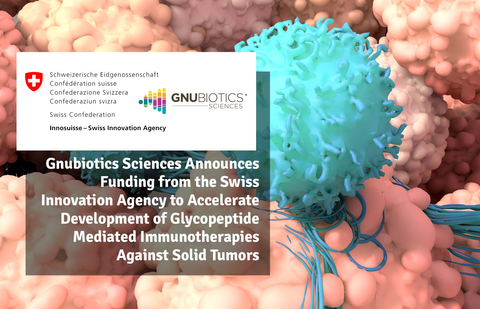LAUSANNE, Switzerland– Gnubiotics Sciences, a biotech company pioneering the discovery and development of immunomodulatory glycopeptides, today announced that the Swiss Innovation Agency (Innosuisse) will support a research collaboration with the University Hospital Zürich to accelerate the development of Gnubiotics’ GLAAD technology in a range of solid tumors. The total project cost of CHF 1.4 million (USD 1.4 million) will be supported by the grant from Innosuisse as well as contributions from Gnubiotics.
Altered glycosylation of tumors is a signature of cancer development, making glycans an emerging target especially in immunotherapy resistant patient cohorts. The sponsored project will advance GNU201 and GNU101, as potential first-in-class immunotherapeutics that steer immune responses to control growth in solid tumors expressing altered O-glycan profiles thus responding to a critical need in non-responding patients. The multi-year project which will include dose-finding and key translational studies, forms a core part of a broader preclinical development plan that will support an Investigational New Drug Application (IND).
“This support from Innosuisse and continued close collaboration with Prof. Michael Scharl`s group at the University Hospital Zürich provide further validation of our GLAAD platform, which holds great therapeutic potential for anti-PD-1 resistant and other non-responsive patient cohorts” stated Yemi Adesokan, Ph.D., Gnubiotics’s Chief Executive Officer.
Gnubiotics presented compelling data recently at the 2022 American Society of Clinical Oncology (ASCO) annual meeting showing the effect of its glycopeptides platform in driving robust T-cell immune responses against anti-PD-1 resistant tumors in a colorectal cancer mouse model. Also announced recently, was a collaboration with the University of Pennsylvania to explore CAR-T therapy in combination with Gnubiotics’ glycopeptides to enhance CAR-T efficacy in solid tumors.


